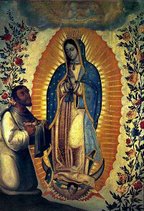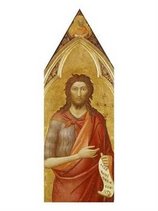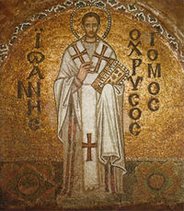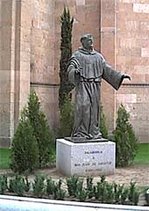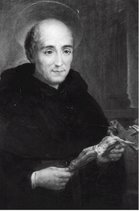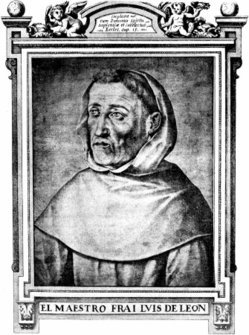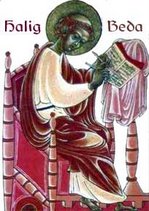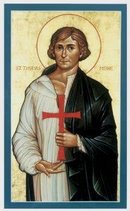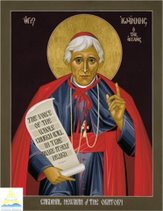Tuesday, May 22, 2007
Beware of Caesar

"But if we remove God from public discourse, we also remove the only authority higher than political authority, and the only authority that guarantees the sanctity of the individual. If the twentieth century taught us anything, it’s that modern states tend to eat their own people, and the only thing stopping this is a resistance based in the human spirit but anchored in a higher authority—which almost always means religious witness."
May 22, 2007
Religious Tolerance and the Common Good
By Charles J. Chaput
Posted by
Antonio449
at
5:26 PM
0
comments
![]()
Sunday, May 20, 2007
Fray Luis's Ode on the Ascension
The Ascension
And now Holy Shepherd
You leave Your flock
in this deep, dark valley
amidst solitude and tears.
And making Your way through the pure air
You return to Your immortal abode.
Those who before were fortunate.
raised at Your breast,
Are now sad and afflicted
Having lost You.
Where will they place their attention now?
What won’t be odious
To the eyes of those
who once beheld the beauty of Your face?
Who, having heard your sweet voice
Won’t consider himself unfortunate and deaf?
The raucous sea,
who will bring it peace?
Or halt the wild, angry wind?
And you being hidden,
Who will guide the ship to port?
Oh, clouds envious even of this brief pleasure.
What do you complain about?
And where do you fly off to in such a hurry?
How richly you go away
leave us behind
so miserable and blind!
ODA XVIII - EN LA ASCENSIÓN
¿Y dejas, Pastor santo,
tu grey en este valle hondo, escuro,
con soledad y llanto;
y tú, rompiendo el puro
aire, ¿te vas al inmortal seguro?
Los antes bienhadados,
y los agora tristes y afligidos,
a tus pechos criados,
de ti desposeídos,
¿a dó convertirán ya sus sentidos?
¿Qué mirarán los ojos
que vieron de tu rostro la hermosura,
que no les sea enojos?
Quien oyó tu dulzura,
¿qué no tendrá por sordo y desventura?
Aqueste mar turbado,
¿quién le pondrá ya freno? ¿Quién concierto
al viento fiero, airado?
Estando tú encubierto,
¿qué norte guiará la nave al puerto?
aun deste breve gozo, ¿qué te aquejas?
¿Dó vuelas presurosa?
¡Cuán rica tú te alejas!
¡Cuán pobres y cuán ciegos, ay, nos dejas!
Posted by
Antonio449
at
5:23 PM
0
comments
![]()
Wednesday, May 16, 2007
Newman: Can there be a Christian or Catholic Literature?

From the Idea of the University: Discoure 9- Duties of the Church Toward Knowledge (selections)
6.
(II.) . . . . so that Literature is to man in some sort what autobiography is to the individual; it is his Life and Remains. Moreover, he is this sentient, intelligent, creative, and operative being, quite independent of any extraordinary aid from Heaven, or any definite religious belief; and as such, as he is in himself, does Literature represent him; it is the Life and Remains of the natural man, {228} innocent or guilty. I do not mean to say that it is impossible in its very notion that Literature should be tinctured by a religious spirit; Hebrew Literature, as far as it can be called Literature, certainly is simply theological, and has a character imprinted on it which is above nature; but I am speaking of what is to be expected without any extraordinary dispensation; and I say that, in matter of fact, as Science is the reflection of Nature, so is Literature also—the one, of Nature physical, the other, of Nature moral and social. Circumstances, such as locality, period, language, seem to make little or no difference in the character of Literature, as such; on the whole, all Literatures are one; they are the voices of the natural man.
. . . . . . . . .Man will never continue in a mere state of innocence; he is sure to sin, and his
literature will be the expression of his sin, and this whether he be heathen or Christian. Christianity has thrown gleams of light on him and his literature; but as it has not converted him, but only certain choice specimens of him, so it has not changed the characters of his mind or of his history; his literature is either what it was, or worse than what it was, in proportion as there has been an abuse of knowledge granted and a rejection of truth. On the whole, then, I think it will be found, and ever found, as a matter of course, that Literature, as such, no matter of what nation, is the science or history, partly and at best of the naturalman, partly of man in rebellion. {229}
7.
Here then, I say, you are involved in a difficulty greater than that which besets the cultivation of Science; for, if Physical Science be dangerous, as I have said, it is dangerous, because it necessarily ignores the idea of moral evil; but Literature is open to the more grievous imputation of recognizing and understanding it too well. Some one will say to me perhaps: "Our youth shall not be corrupted. We will dispense with all general or national Literature whatever, if it be so exceptionable; we will have a Christian Literature of our own, as pure, as true, as the Jewish." You cannot have it:—I do not say you cannot form a select literature for the young, nay, even for the middle or lower classes; this is another matter altogether: I am speaking of University Education, which implies an extended range of reading, which has to deal with standard works of genius, or what are called the classics of a language: and I say, from the nature of the case, if Literature is to be made a study of human nature, you cannot have a Christian Literature. It is a contradiction in terms to attempt a sinless Literature of sinful man. You may gather together something very great and high, something higher than any Literature ever was; and when you have done so, you will find that it is not Literature at all. You will have simply left the delineation of man, as such, and have substituted for it, as far as you have had any thing to substitute, that of man, as he is or might be, under certain special advantages. Give up the study of man, as such, if so it must be; but say you do so. Do not say you are studying him, his history, his mind and his heart, when you are studying something else . . . . . .
Such is man: put him aside, keep him before you; but, whatever you do, do not take him for what he is not, for something more divine and sacred, for man regenerate. Nay, beware of showing God's grace and its work at such disadvantage as to make the few whom it has thoroughly influenced compete in intellect with the vast multitude who either have it not, or use it ill. The elect are few to choose out of, and the world is inexhaustible. From the first, Jabel and Tubalcain, Nimrod "the stout hunter," the learning of the Pharaohs, and the wisdom of the East country, are of the world. Every now and then they are rivalled by a Solomon or a Beseleel, but the habitat of natural gifts is the natural man. The Church may use them, she cannot at her will originate {231} them. Not till the whole human race is made new will its literature be pure and true. Possible of course it is in idea, for nature, inspired by heavenly grace, to exhibit itself on a large scale, in an originality of thought or action, even far beyond what the world's literature has recorded or exemplified; but, if you would in fact have a literature of saints, first of all have a nation of them.........
If then by Literature is meant the manifestation of human nature in human language, you will seek for it in vain except in the world. Put up with it, as it is, or do not pretend to cultivate it; take things as they are, not as you could wish them.
Posted by
Antonio449
at
10:29 PM
0
comments
![]()
Tuesday, May 15, 2007
Sophists and Politics
I return again to Gorgias. It’s well known that the author of the lost book “On Non-Existence or On Nature” argued that language is the only valid thing that really exists because it permits one to achieve whatever he would set out to do. And he reasoned (badly at that) lining up these three propositions: 1) nothing exists, 2) if something existed it could not be known 3) if something could be known it could not be communicated.
It’s a whole nihilistic intelectual program very useful for manipulating other people via arbitrary political power and related means of communication. It’s an entire Civic Education in which the only thing that matters is to practice sophistic argumentation which is what Plato criticized Gorgias for. Whose sole object- as Aristotles also criticized- was to enjoy the maximum amount of power, money and fame fooling people with sophist arguments.
Vuelvo un momento a Gorgias. Es sabido que este autor del perdido texto "Sobre la No-Existencia o Sobre la Naturaleza" argumentaba que el lenguaje es lo único válido que realmente existe, porque permite lograr lo que cada cual pretenda. Y razonaba (mal) encadenando estas tres proposiciones: "1) nada existe; 2) si algo existiera, no podría ser conocido; 3) si algo pudiera ser conocido, no podría ser comunicado".
Es todo un programa de nihilismo intelectual, muy útil para la manipulación de "los demás" desde la propia arbitrariedad en el poder político y los medios de comunicación afines. Y es todo un programa de "Educación cívica", en la que sólo interesa practicar la argumentación sofística, como Platón reprochaba a Gorgias, cuyo objetivo único -como también le reprochaba Aristóteles- consiste en lucrar el máximo de poder, fama y dinero engañando con sofismas la credulidad de la gente.
Posted by
Antonio449
at
9:53 PM
1 comments
![]()
Sunday, May 13, 2007
God and morality

"Often when we say Holy, Holy, Holy is the Lord of Hosts we think "Moral, Moral, Moral". As if God were super Moral. Now this is not untrue but it is incomplete. The Lord is not a supernaturalized version of Immanuel Kant. I mean, that would be depressing and Heaven would turn into Hell in short order. "
Citation: Fr. Corbett O.P. in a talk given at the Dominican House of Studies, Washington D.C, March 8, 2007: "Mary & the Victory of Evil:
The Marian Role in the Resoration of the Image of God."
Posted by
Antonio449
at
7:54 PM
2
comments
![]()
Monday, May 07, 2007
Episcopal Converts to Catholicism: Annoying Everyone since 1967.
Reno puts the smack down on multiculturalism via the story of young Moses:
In this Article
Moses came to maturity as the ultimate multicultural man, the Barak Obama of the ancient world. Born to Hebrew parents, Moses ended up in Pharaoh’s household. He had a solid, genetic link with the oppressed, but he also got a good, elite education. Moses might have looked a little out of place in Pharaoh’s court, but that was a good thing, because it gave him a critical perspective. Child of enslaved nomads, he developed the sort of marginal, outsider sensibility currently prized by literary theorists as “alterity” or “otherness.” . . . . . . . . .
Posted by
Antonio449
at
9:26 PM
0
comments
![]()




